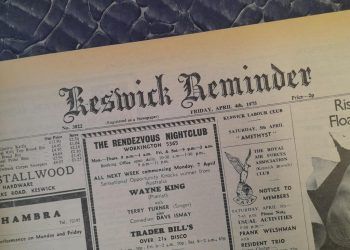
Nobbut Laiking, by Ross Brewster
We need to talk. Seriously, we need to re-learn the ancient British art of making small talk before it is lost forever.
I picked up on an interview one day last week on local radio with the author of a book about social anxiety. The lost art of conversation.
The gist of the interview was that one in five of us is suffering from social anxiety. Making friends, even casually at work, on the bus or train, in the café or pub, is getting harder.
You only have to look at Amazon’s book store to see how many writers are making a living from educating us in what should surely come naturally without spending 20 quid on some Americanised nonsense.
The Americans are the worst when it comes to talking. Studies show they feel less connected to their fellow humans as the art of conversing gradually dies.
I can tell you a major cause without spending money on books, or feeling the need to consult clinics and gurus who promise to make you feel better and your bank account lighter.
That little rectangular shaped device in your hand. Put it away. There, that’s a start along the path to recovery.
Nearly all of us have one. We have convinced ourselves how indispensable they are. How could we live without them? How would we fill every idle moment without a scroll button to produce our emails and our entertainment?
We have already lost the skill of writing letters. Who, apart from elderly people who don’t have smartphones and laptops, sends a handwritten letter any more?
Don’t let us lose the art of small talk as well. Not even that good old stand-by, the weather, seems to work.
Wherever you go now there are people with their heads down, prodding a keypad. You can’t possibly strike up a chat with a stranger when you aren’t even looking at them.
It’s awful seeing families in restaurants, mum, dad, the kids, all non-communicating as they sit playing with their phones.
There are times when we love ’em. Like if we break down in the car and need help. People with serious health problems also need a phone in case of emergencies.
Look, I confess. Until a year ago I had managed to make do with the most basic of phones. One that did nothing much other than make and receive calls.
But then I succumbed to the need to be like everyone else and have a phone that did just about everything except make the tea.
It can easily become an addiction. I can understand now how quickly the smartphone can become the most important thing in your life.
You can’t halt progress, if progress is what it is. You can’t turn the clock back to some happier, chattier golden age. The implication in all the self-help books is that it has made us scared of starting a conversation, no matter how trivial.
So switch off once in a while. Smile at people around you. “There’s snow forecast for Christmas.” A perfect ice breaker. Even a talking point about the miserable summer weather can spark off a conversation.
Most of all, put the phone away. It’s a barrier between you and the rest of the world. Practise a bit of small talk. You never know. You might find you make a new friend.
It’s down to the parents
Parents have a big part to play in weaning kids off excessive use of phones.
A number of schools have introduced policies surrounding phones in the classroom. The Ormiston Academies Trust, for example, has banned phones during the day, affecting 35,000 pupils in 42 schools.
Their aim is to minimise disruption and improve behaviour in classrooms. But ultimately it’s down to parents. Schools can’t deal with the addiction without parental support.
Being prepared for the worst
I had a squash partner whose unusual job was writing about living people as if they had just died. He was the official obituarist for a TV company.
It’s one of the best-kept secrets in journalism. Being prepared. The Times has 3,500 obituaries of famous people already on file and ready to be dropped into the newspaper the moment one of them kicks the bucket. It will be the same at the BBC and ITV who rely on the immediacy of news, even bad news.
For many years The Times was sniffy about including obits of pop stars. When Mick Jagger asked to see his obituary his request was refused. He took it in good grace.
Deaths have always been a part of local newspapers. I remember my first obituary and the visit to the deceased worthy’s home to interview his widow and family.
I listened patiently to the details of the man’s life and tea was served. Then the grieving wife spoke up. “Would you like to see him before you leave,” she inquired.
Crikey, I thought he was dead. And here she’s telling me he is in the front room.
It was tradition in some families to have the dear departed at home prior to the funeral. It was my first dead body of many to come.








